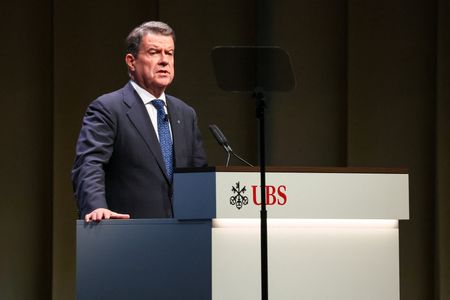By Noele Illien
BASEL, Switzerland (Reuters) – UBS executives on Wednesday told shareholders that the bank has major concerns about the Swiss government’s recently announced plan to hit the country’s largest lender with tougher capital requirements.
The government laid out plans two weeks ago for how to police banks deemed “too big to fail” to shield the country from a repeat of the collapse of Credit Suisse, which UBS acquired in a rescue arranged by the authorities and backed by the state. “We are seriously concerned about some of the discussions related to additional capital requirements,” UBS Chairman Colm Kelleher said at the bank’s annual general meeting in Basel.
“Additional capital is the wrong remedy.”
UBS might need to find $15 billion to $25 billion in additional capital to comply with proposed new requirements, according to the finance ministry.
Kelleher said Credit Suisse had failed not because of insufficient capital requirements, noting that they had been on the rise for global banks since the 2007-2009 financial crisis, making them more resilient.
“Effective loss-absorbing capacity has increased around 20 times since the global financial crisis of 2008,” he said. “At our firm, it now exceeds $200 billion.”
UBS’s takeover of its long-term rival Credit Suisse stirred fears that the enlarged bank, with a balance sheet roughly double the nation’s annual economic output, could upend the Swiss economy if it ran into trouble.
Shares in Zurich-based UBS traded down by more than 2% on Wednesday afternoon, underperforming European peers.
The Credit Suisse rescue prompted the government to craft a plan aimed at making the banking system more robust and to prevent a possible UBS collapse, although a long legislative process is still pending.
Despite this prospect of tougher capital rules, Kelleher said UBS remained committed to distributing cash to shareholders via dividends and share repurchases.
“UBS is not too big to fail,” he said, calling it one of the “best-capitalized” banks in Europe.
The chairman said UBS aimed for total capital returns to exceed pre-acquisition levels by 2026.
Speaking at the meeting, UBS CEO Sergio Ermotti said the merger of the two banks’ Swiss entities should occur before the end of the third quarter, and that difficult decisions still lay ahead during the Credit Suisse integration.
“Despite our efforts to lessen the impact, in the short to medium term we will need to part ways with some colleagues,” Ermotti said after a weekend media report said the bank was planning five rounds of lay-offs in the coming months.
Ermotti’s 14.4 million Swiss franc ($15.75 million) pay for nine months of 2023, which made him the highest-paid banker in Europe, was heavily criticized by a number of shareholders.
“As a CS investor, I do feel pretty lousy,” shareholder Guido Roethlisberger told the annual gathering.
Credit Suisse’s rescue, arranged under emergency legislation, bypassed the bank’s shareholders, and all but wiped them out, prompting calls for compensation from some groups.
Still, the compensation awarded to Ermotti and senior management was approved by a large majority of votes cast.
Kelleher defended the CEO’s pay.
“He arguably has the toughest job in the financial services industry globally, and he has delivered,” Kelleher said.
(Reporting by Noele Ilien, writing by Andrey Sychev; Editing by Dave Graham and Tomasz Janowski)





